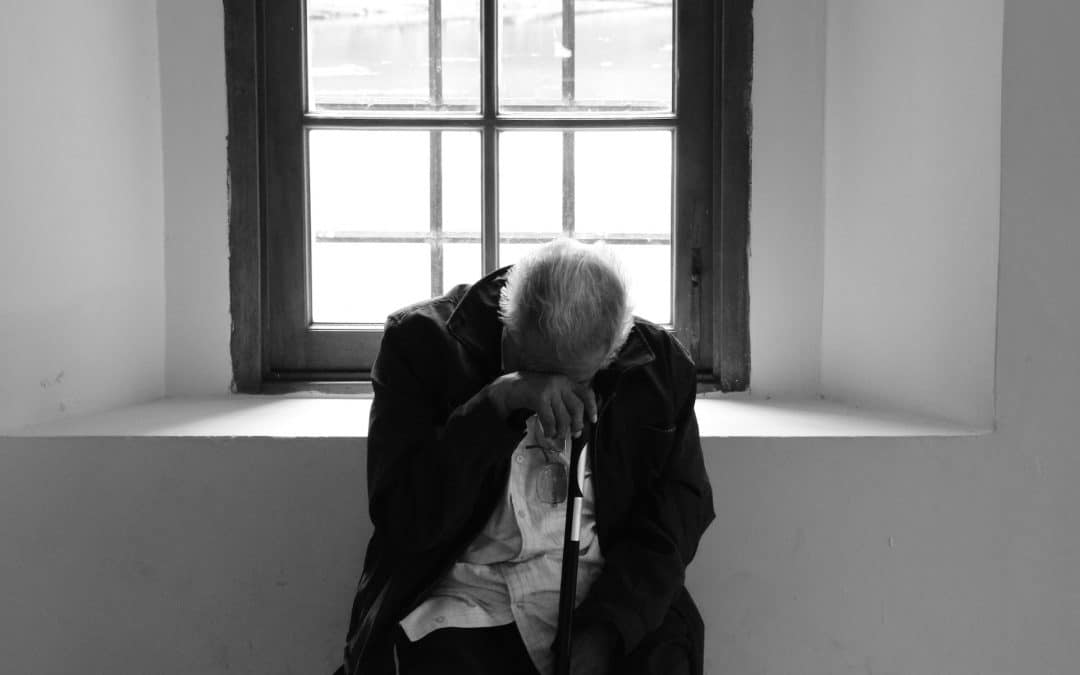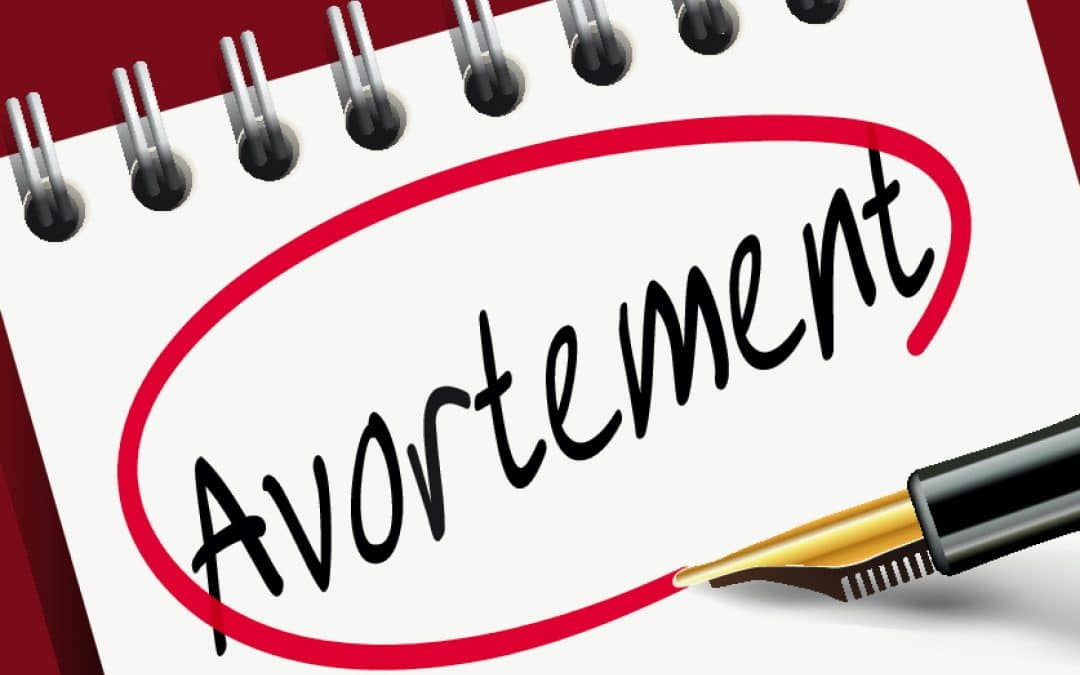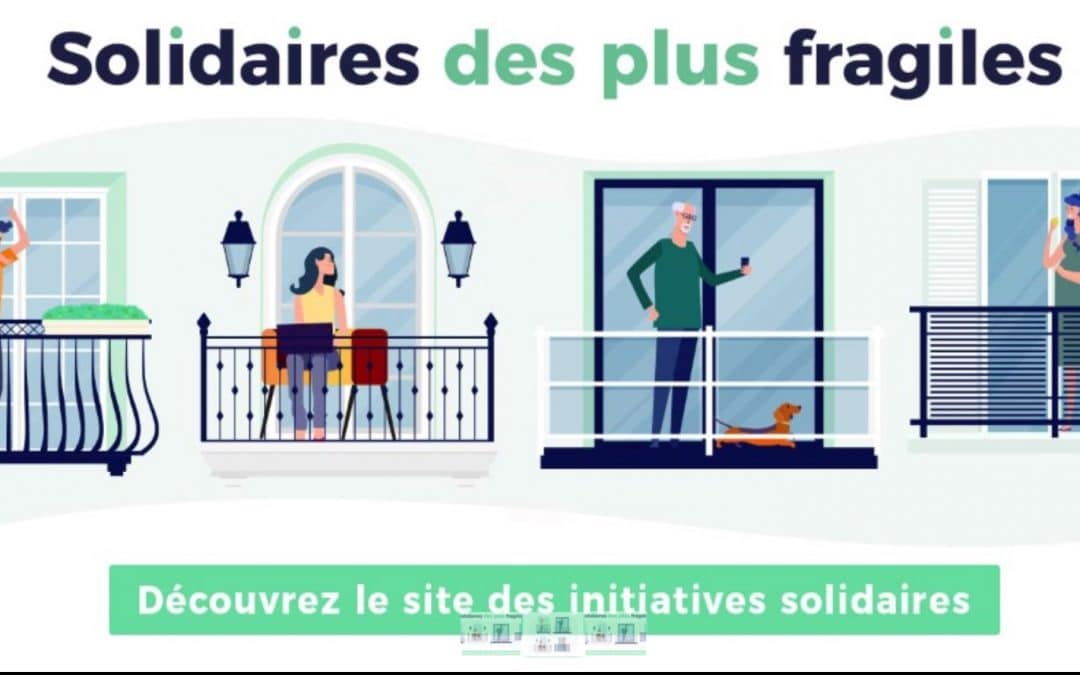
by Alliance VITA | April 15, 2020 | News, Coronavirus, Old age and Dependency
In his TV address of Monday April 13, French President Emmanuel Macron announced that the COVID-19 confinement would be extended until May 11.
However, the President specified that “the most vulnerable, the elderly, those with severe disabilities or people with chronic diseases will be asked to remain confined at home for their own safety, even after May 11, at least for a start.”
The President of the Republic called on healthcare establishments to allow flexibility in the visiting rules in favor of people reaching the end of their life. “It’s not only the virus that kills. Extreme loneliness or giving up the resort to treatment of other diseases can also be perilous. I also wish that hospitals and retirement homes will organize visits with the proper measures of protection for families to say their farewells to their sick beloved at the end of their lives.”
Pascal Champvert, the president of the Association of Directors of Services and Establishments for the Elderly (“AD-PA”) said, in an interview on France Info radio, that he had “been heard only partially”. In accordance with the recommendations by the National Consultative Ethics Committee, he believes that visits should not only be allowed for those at the end-of-life, but also for people who are psychologically affected by this pandemic situation. Organizing such visits seems to be feasible, since residents in nursing homes are confined to their rooms, leaving the common spaces empty. “It is therefore possible to allow one person from each family to meet with a resident in these spaces, with proper safety measures for social distancing, mask, and hand cleaning.”
Pascal Champvert emphasizes that such meetings are “essential”, as well as allowing residents to go outside for a walk in the establishments’ parks and gardens.
In addition, he insists that “testing is essential to set up a much more adjusted strategy against the virus, not only in health establishments but also at home. The elderly must be tested, and also their families and caregivers. ”
Starting on May 11, town halls will provide masks for the population, while wearing masks “may become compulsory” on public transport and for workers who are most at risk of exposure.
As Tugdual Derville, Alliance VITA’s General Delegate and founder of SOS End-of-life, put it : “It was high time to admit how inhumane it was to impose absolute isolation on dependent elderly people. Whatever our age, social encounters give us reasons to live. And the most vulnerable people are those for whom these social encounters are vital. 7000 residents in “EHPADs” (nursing homes) have already died, often without accompaniment by their kins, it is a tragedy for those who have died, for their caregivers and their loved ones. We now must take into account these mixed feelings of anger and guilt. Let us not think that the many deaths of elderly people are not part of the present humanitarian and health disaster”.
SOS End-of-life service along with its website, both branches of Alliance VITA, has created a dedicated web space to answer questions arising during the coronavirus pandemic to assist those who are sick, isolated or facing the end of their life.
___________________________
SOS Fin de vie (SOS End-of-Life) – Tel: 33 (0)1 42 71 32 94 – ecoute@sosfindevie.org
www.sosfindevie.org

by Alliance VITA | April 8, 2020 | Coronavirus, News, Surrogacy
On April 3rd, in the midst of the COVID-19 pandemic and behind closed doors in the Capitol, the state of New York voted to legalize commercial gestational surrogacy as part of the 2021 budget package.
To become effective in February 2021, the new legislation will allow a single person, or any couple (whether male-female, female-female or male-male), to pay a woman to bear a child. In order to avoid any legal quagmires and to prevent the surrogate mother from keeping the infant, the baby should be conceived from an egg that is not that of the surrogate mother. The law provides that the “future parents” pay for legal representation and healthcare for the surrogate mother who must be at least 21 years of age. The “future parents” must also provide life insurance for the surrogate mother during pregnancy and for one year after the delivery. Nonetheless, the latter provision does not make this law more acceptable.
In February, New York State Governor Andrew Cuomo once again launched a campaign in favor of the surrogacy legislation.
Opponents denounce it as a serious violation of women and children’s rights. This new law is all the more controversial as it occurs during an unprecedented health crisis and without public debate.
In June 2019, American feminist Gloria Steinman wrote an open letter to oppose the legalization of commercial surrogacy in New York State. “Under this bill, women in economic need become commercial vessels for rent, and the fetuses they carry become the property of others. The surrogate mother’s rights over the fetus she is carrying are greatly curtailed and she loses all rights to the baby she delivers. The bill ignores the socio-economic and racial inequalities of the reproductive commercial surrogacy industry, and puts disenfranchised women at the financial and emotional mercy of wealthier and more privileged individuals. […] Women, children and families deserve a life that is not dictated by the profit of a commercial third party. ”
As Member of the New York State Assembly, Deborah Glick told The New York Times that surrogacy is “pregnancy for a fee” and that she finds “that commodification of women troubling.”
Kathleen Gallagher of the New York State Catholic Conference, criticized the inclusion of surrogacy in a budget bill amidst the COVID-19 pandemic.
“We simply do not believe that such a critical legal and moral decision for our state should have been made behind the closed doors of a Capitol shut off to the public,” she said. “The new law is bad for women and children, and the process is terrible for democracy.”

by Alliance VITA | April 3, 2020 | Coronavirus, End of life, Euthanasia and Suicide, News
On March 29th, the French Journal Officiel published a decree authorizing “off-label” prescriptions of Rivotril® until April 15, 2020, that is, prescribed for conditions that have not received marketing authorization. It will be dispensed as an injection on an outpatient basis in the context of the Covid-19 epidemic.
This decree allows local pharmacies to dispense this drug for patients with COVID-19, or those suspected of being infected, if their clinical condition requires it, with a prescription specifying “Off-label Prescription for Covid-19”.
The purpose is clearly to allow doctors a treatment for their patients who have acute respiratory distress at the end of their life. This drug is usually prescribed as a sedative, according to the recommendations of the “SFAP” (French Society for Accompaniment and Palliative Care) which updated its informational leaflets for doctors due to the current pandemic.
This drug belongs to the class of benzodiazepines, such as midazolam, Valium® (diazepam), Narcozep®, Lexomil®, Xanax®, Rohypnol® (flunitrazepam) or Tranxene® (clorazepate). Rivotril® (clonazepam), like those other molecules, has diverse effects on the patient depending on the dose dispensed: sedative effect against anxiety, hypnotic effect (to induce sleep, or coma) or anticonvulsant effect (to treat epilepsy, for which it received marketing authorization).
Just as the previously mentioned drugs, the effect of Rivotril® varies depending on the dose administered, particularly it causes respiratory depression.
Rivotril®‘s long half-life (time necessary for eliminating half of concentration after administration) is both beneficial (it avoids lengthy perfusions) and also a disadvantage because patients’ differences make it difficult to adjust the dosage for the objective sought. Furthermore, the additional use of other drugs such as those belonging to the morphine class can potentiate the effect of Rivotril®.
Modifying the specific marketing authorization for this drug shows the present shortage of sedatives such as midazolam, or diazepam, with well-known properties. This emphasizes the need to use Rivotril® as an anxiolytic and palliative care but not for euthanasia.
Rivotril® can be administered by subcutaneous injection twice a day. Since its half-life is considerably longer (30 to 40 hours) compared to midazolam (2 hours half-life), Rivotril® is of easier use for caregivers for it can be administered without perfusions, with a mere injection regularly renewed. Thus however, Rivotril® doses are less adjustable that midazolam.
Allowing Rivotril® to be prescribed off-label as an injection, on an outpatient basis follows the same logic as off-label prescriptions of midazolam for implementing sedation, (as the French Health Ministry announced last February). However, the authorization only applies to Covid-19 patients, with acute respiratory distress (asphyxia), and who are not to be ressuscitated.
Therefore, Rivotril® is efficacious and apparently easy to use, although clearly labeled as being contraindicated in cases of “severe respiratory failure”. Thus, these extended authorizations may greatly increase the risk of euthanasia since the caregivers who use Rivotril® may not have proper training or experience, and may lack team-work. The collegial dimension for implementing such palliative care in private practice or in nursing homes and medico-social establishments could also indeed be called into question.
On March 26, Alliance VITA relayed several caregivers’warning about the dangers of “transitory and exceptional” protocols and the dangers of hastily implementing palliative care for respiratory distress, without adequately attempting to treat patients beforehand.
The March 28th decree specifies that when prescribing off-label pharmaceutics, “the doctor should comply with the transitory and exceptional protocols to treat dyspnea” as well as “provide palliative care of respiratory distress, according to the French Society for Accompaniment and Palliative Care (“SFAP”) and as posted on its website.”
Alliance VITA reminds us that although palliative care is a precious necessity, it also requires appropriate training. The role of palliative care is not to compensate the lack or abandonment of necessary treatment by categorizing patients as “at the end-of-life” when they should have access to curative therapy. Therefore, Alliance VITA association warns against possible transgressions by misusing a drug, either voluntarily or involuntarily, to cause euthanasia. Alliance VITA also underlines the importance of not basing therapeutic decisions uniquely on the age of a patient who remains personally concerned.
To put a break on the risks of serious drift, Alliance VITA has proposed a 24/7 on-call national or regional service for geriatricians and experienced palliative care doctors, instead of expecting lone practitioners to “comply” with pre-established protocols. Any emergency prescriptions of Rivotril® for cases of Covid-19, in accordance with the new decree, would be submitted to their approval. The collegial decision-making and availability of medical supplies then have to be anticipated.
Given the complex situations caregivers are facing, Alliance VITA’s SOS End-of-life listening service, has created an informational web space dedicated to the caregivers. It aims at offering those who wish it an opportunity to take a step back through exchanges with other caregivers. This service has been opened in cooperation with the VITA network of caregivers among other structures.

by Alliance VITA | April 3, 2020 | Coronavirus, Abortion, News
Repeatedly questioned by Senator Laurence Rossignol (Oise Socialist Party) about facilitating access to abortion during the confinement period, the French Health Minister, Olivier Véran declared, during the government session on April 1, 2020, that he was concerned about “an alarming drop in the number of abortions”, but declined to consider modifying the legal time limits in a hurry.
On March 19, during the French Senate’s debate on the Covid-19 emergency bill, Senator Laurence Rossignol had introduced an amendment to allow abortion 2 weeks later than under current law (that is up to 14 weeks of pregnancy rather than 12). She feared that abortion might be hindered or delayed due to the confinement. The Government and the Senate Law Commission did not approve of the measure and the amendment had been rejected.
Senator Rossignol came back on the offensive again during the session of questions to the government, which have been transformed into questions of control during the national health emergency. She quoted an opinion article published the day before in the newspaper “Le Monde”, signed by more than a hundred abortion professionals requesting to make abortion easier by:
- extending the deadline for having a drug-induced abortion at home from 5 to 7 weeks of pregnancy;
- suppressing the 48-hour reflection period for minors (time between the compulsory psychological consultation and the written informed consent to abortion), thus proposing that abortion might be carried out immediately following the first consultation;
- and by extending the current 12-week maximum allowed by law, to 14 weeks, due to confinement-related difficulties.
On April 1, on a “France Inter” radio morning program, one of the co-signers of the opinion article admitted that some fellow gynecologists did not approve their taking advantage of the current health emergency to submit proposals, which she denied.
The Health Minister declared that the technical aspects of an extension of deadlines for drug-induced abortions performed at home were to be examined, and the issue of time limits for abortion, if justified, would be assessed at the end of confinement.
Extending the time limits for drug-induced abortions at home
As an echo to the recommendations of the Association of Gynecologists, the Health Minister suggests to facilitate at-home abortions, while at the same time “guaranteeing women’s free choice” on abortion methods. In France, drug-induced abortions may be legally carried out at home until 5 weeks of pregnancy and, in hospital, until 7 weeks. Beyond these time limits, only surgical procedures can be performed.
One may be preoccupied to see at-home abortions promoted during the health crisis. This abortion method entails physical and psychological risks, especially since it speeds up the decision making. Suppressing the reflection period is also a matter of preoccupation because it could emphasize the stress on young people.
In addition, these abortions are known to set off additional risks which require careful monitoring. The law holds that if a woman goes through complications, she must be able, within an hour, to reach the health center with which the doctor, midwife, or planning center has signed an agreement. In addition, there are specific protocols for the period between 5 and 7 weeks of pregnancy, during which pain, bleeding and the risk of hemorrhage may be greater.
Is there really any priority why “confined abortion” should be encouraged, and caregivers dedicated to perform these procedures? Is this how we show our respect to women?
Voluntary interruption of pregnancy, abortions for medical reasons and psychosocial Distress
Those requesting the extension from 12 to 14 weeks of pregnancy in the case of surgical abortions, specify that it would most likely concern women exposed to violence in their homes, as if abortion were the ultimate solution. Quite contradictory when violence is known to be also exerted on pregnant women to pressure them into aborting against their will. Nonetheless, the Health Minister said that, depending on the number of serious requests for late abortions at the end of the confinement, an assessment would be made of the bill in order to consider abortion for “psychosocial distress”, allowing abortion up to 9 months of pregnancy, if the pandemic has postponed the abortion.
For those who claim to advocate women, it is urgent to protect them from all kinds of violence, including against the pressure, often originated by men, to urge women to abort against their will.

by Alliance VITA | April 3, 2020 | Coronavirus, Disabled, End of life, News, Old age and Dependency
Like many others in France, Alliance VITA is deeply concerned about the most vulnerable: those who are elderly, sick, isolated, or disabled, and who are even more vulnerable during this period of pandemic and confinement.
In light of these circumstances, we have created a platform entitled “Supporting the Most Vulnerable”.
The purpose is to make a list of solidarity initiatives for the innumerable needs we are confronting during these difficult times. Everyone can contribute by sharing an initiative on the website’s “Contribute” page.
So many people have become vulnerable due to this situation. Many are isolated, disoriented, and suffering.
It’s time for solidarity! Sharing our good ideas stimulates innovation and helps us adapt in order to address specific needs, to keep providing better service to those who need it most (those who are vulnerable, caregivers, farmers etc.) and our society as a whole.
May this suggestion box encourage everyone to take part, without delay, so that hope will triumph.
You are invited to discover this platform here.





